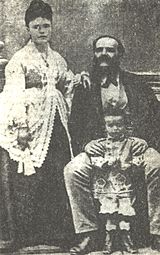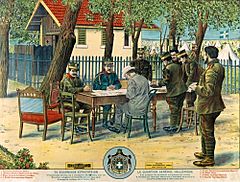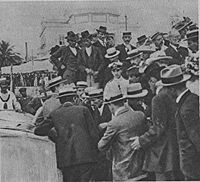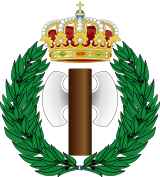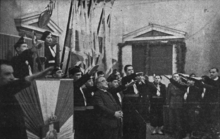Ioannis Metaxas facts for kids
Quick facts for kids
Ioannis Metaxas
|
|
|---|---|
| Ιωάννης Μεταξάς | |
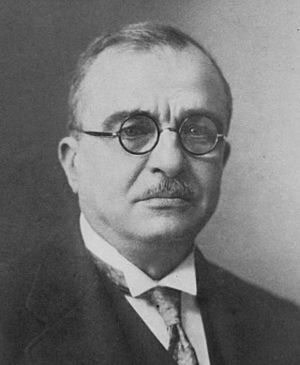
A photo of Ioannis Metaxas.
|
|
| Prime Minister of Greece | |
| In office 13 April 1936 – 29 January 1941 |
|
| Monarch | George II |
| Preceded by | Konstantinos Demertzis |
| Succeeded by | Alexandros Koryzis |
| Personal details | |
| Born | 12 April 1871 Ithaca, Kingdom of Greece |
| Died | 29 January 1941 (aged 69) Athens, Kingdom of Greece |
| Political party | Freethinkers' Party (1922–1936) Independent (1936–1941) |
| Alma mater | Hellenic Army Academy Prussian War College |
| Awards | |
| Signature |  |
| Military service | |
| Allegiance | |
| Branch/service | |
| Years of service | 1890–1920 |
| Rank | |
| Unit | Army of Thessaly |
| Commands | Epistratoi |
| Battles/wars | Greco-Turkish War (1897) Balkan Wars
|
Ioannis Metaxas (born 12th April 1871, died 29th January 1941) was a Greek military officer and politician. He served as the Prime Minister of Greece from 1936 until his death. For the first four months, he governed under the constitution. After that, he became the powerful leader of the 4th of August Regime, with the support of King George II.
Metaxas was born into an important family in Ithaca. He fought in the Greco-Turkish War of 1897 and the Balkan Wars (1912–13). He quickly moved up in the Hellenic Army. During a time of big political division in Greece, called the National Schism, Metaxas supported the king. He was against Prime Minister Eleftherios Venizelos and Greece joining World War I. Because of this, he was sent away to Corsica in 1917.
When he returned, Metaxas entered politics and started the Freethinkers' Party. But he didn't have much success during the time of the Second Hellenic Republic. The Greek monarchy was brought back in 1935. Metaxas was then made Prime Minister in April 1936. On 4th August 1936, with King George II's help, Metaxas took control of the government. He set up a strong, nationalist, and anti-communist government.
Metaxas tried to keep Greece neutral at the start of Second World War. But on 28th October 1940, he famously said "No!" to Italy's demand for Greece to surrender. This brought Greece into the war on the side of the Allies. He died in January 1941, before Germany invaded Greece.
Contents
Early Life and Military Career
Ioannis Metaxas was born in Ithaca in 1871. His family was from the Ionian islands, which used to be part of Venice. They were a proud, old family with roots in the Byzantine nobility.
After studying at the Hellenic Military Academy, he became a military officer in 1890. He first fought in the Greco-Turkish War of 1897. He worked with the staff of the Greek commander, Crown Prince Constantine.
Metaxas became a close helper of Constantine. His career grew because of the Crown Prince's support. At that time, having a powerful helper like Constantine was very important for a military career in Greece.
After the war, he studied more at the Berlin War Academy from 1899 to 1903. Metaxas was chosen by the Crown Prince to go to Berlin. His German teachers gave him high marks. They even called him "a little Moltke" because he was short but very smart. His time in Germany made him admire the German military system.
In his diary, he wrote that he wanted to serve his king and crown prince. He believed the king represented the nation's past, present, and future. He didn't like Greece's "too much parliamentarism." He preferred the German system where the leader answered to the Emperor, not the parliament. When he returned in 1904, he joined the new General Staff Corps. He helped modernize the Greek Army before the Balkan Wars (1912–13).
The Balkan Wars
In 1910, Prime Minister Eleftherios Venizelos made Metaxas his assistant. Venizelos wanted to improve relations with the monarchy. Metaxas, who admired Germany, was against Venizelos's decision to have French military experts train the Greek Army. He almost quit in protest. In 1912, before the Balkan Wars, Venizelos sent Metaxas to Sofia to negotiate a military agreement between Greece and Bulgaria.
He fought in the First Balkan War as a Captain. He then joined Venizelos as a military expert at a conference in London in December 1912. In May 1913, he helped negotiate the military terms of the Greek–Serbian Alliance.
He also fought in the Second Balkan War and was promoted to Lieutenant Colonel. After the Balkan Wars, he became deputy head of the Army Staff Service in January 1915. In October 1913, the King gave him the Golden Cross of the Redeemer.
World War I and the National Schism
When World War I started, Greece had to decide if it would join the war. Serbia asked Greece for help against Austria and Bulgaria. Greece said no, because it didn't have enough troops to fight Bulgaria too.
Disagreement with Venizelos
Britain, France, and Russia (the Entente Powers) offered Greece land in Asia Minor if it joined the war. This was to help Serbia and get Bulgaria to join their side. Prime Minister Venizelos wanted to accept this offer. But Metaxas thought it was too risky. He wrote a report saying that Greece would be in danger. He believed the Serbian army might be defeated too quickly. He also worried about Turkey harming Greeks in Asia Minor if Greece joined the war. Venizelos disagreed with Metaxas's report.
In February 1915, the Entente Powers attacked Gallipoli. Venizelos offered to send Greek troops and the fleet to help. King Constantine had doubts. Metaxas resigned the next day in protest. He argued that the plan was not good and that Greece was not ready. Because Metaxas resigned, Venizelos called for meetings with the King and former prime ministers. But they couldn't decide. King Constantine chose to keep Greece neutral. Venizelos then resigned in February 1915.
Venizelos won the elections in May 1915 and formed a new government. When Bulgaria joined Germany and mobilized against Serbia, Venizelos ordered Greece to prepare for war. Metaxas was called back to duty as deputy chief of staff. Venizelos allowed British and French troops to land in Thessaloniki to help the Serbian army. He then asked Parliament to join the war. Parliament voted yes. But the next day, King Constantine fired Venizelos. He asked Alexandros Zaimis to form a new government.
The "National Schism"
This disagreement created a deep split in Greek politics. It was called the "National Schism" or National Divide. It caused problems for Greece for many years.
In 1916, King Constantine and the army allowed parts of eastern Macedonia to be taken by Germany and Bulgaria without a fight. This made many people angry, especially in Greek Macedonia. In August 1916, officers loyal to Venizelos started a revolt in Thessaloniki. They set up their own government, called the "Government of National Defence". This new government, with Allied support, took control of half the country and joined the war on the Allies' side.
Meanwhile, the official Greek government and the King remained neutral. King Constantine and Metaxas were accused of being pro-German by their opponents. But they kept talking with the Allies about possibly joining their side.
Metaxas later helped create and lead a group of royalist soldiers called the Epistratoi. This group was involved in events in Athens called the Noemvriana. In June 1917, under pressure from the Allies, King Constantine was removed from power. His son, Alexander, became King. Venizelos returned to power and officially declared war on behalf of all Greece on 29 June 1917.
Life After Exile and Political Career
When Venizelos came to power in 1917, Metaxas and other opponents were sent away to Corsica. He later escaped to Sardinia and then went to Siena, Italy, with his family. In January 1920, Metaxas was sentenced to death while he was away.
He returned to Greece in November 1920 after Venizelos lost the elections. He was put back in the army as a Major General. But he was against Greece continuing the war in Asia Minor against Turkey. He resigned and retired in December 1920. He believed Greece was not ready to control such a large area. He refused offers to lead the Greek army. As a soldier, Metaxas thought Greece didn't have the money or supplies to fight in Anatolia. His disagreement with King Constantine, who wanted to continue the war, caused a rift between them.
After Greece lost the war in Asia Minor, King Constantine was again forced to leave the country. This time, it was by a revolution led by Colonel Nikolaos Plastiras. Metaxas then entered politics and started the Freethinkers' Party in October 1922.
However, he was linked to a failed attempt to overthrow the government in October 1923. This forced him to flee Greece again. Soon after, King George II was also sent away. The monarchy was ended, and the Second Hellenic Republic was declared in March 1924.
Metaxas returned to Greece soon after and said he accepted the Republic. Even though he was a well-known royalist, his political career was not very successful. In the 1926 elections, his party got 15.78% of the votes and 52 seats. This was similar to another royalist party. Metaxas became Communications Minister in a government led by Alexandros Zaimis.
But his party had problems and many members left. In the 1928 elections, his party only got 5.3% of the votes and one seat. In the 1932 and 1933 elections, the percentage dropped even more. Metaxas became Interior Minister in the Panagis Tsaldaris government. Metaxas was seen as the most extreme royalist politician. He openly disliked parliamentary government, which might explain why he wasn't very successful in politics.
By 1933, even other royalist parties had accepted the Republic. They wanted a system with orderly change and the rule of law. Metaxas's idea of a very powerful monarchy was not popular.
In March 1935, there was an attempted coup in Thessaloniki by officers loyal to Venizelos. This coup almost succeeded. Thessaloniki and Greek Macedonia had many Greek refugees from Turkey. These refugees lived in poverty, especially after the Great Depression lowered tobacco prices. Since Greece lost the war in 1922 under King Constantine, the refugees didn't like the royal family. Thessaloniki was known as a place that supported the Republic.
The failed coup worried the Greek leaders. It made them lean more towards the right-wing. Many politicians who were scared of a revolution started to support Metaxas. Metaxas called for a strong "new order" in Greece. He argued that the Great Depression showed democracy had failed and that a strong government was the answer. Because of pressure from extreme royalists like Metaxas, Tsaldaris announced he would hold a vote on bringing back the monarchy.
In the 1935 and 1936 elections, Metaxas's party worked with other small royalist parties. They won seven seats each time. In Athens, Metaxas won 20% of the vote, mostly from middle and upper-class areas. Wealthy people saw Metaxas as the best person to bring "order" to Greece.
Prime Minister and the 4th of August Regime
After a vote that was heavily controlled, King George II returned to the throne in 1935. The voting was clearly unfair. For example, Crete, which was known for supporting the Republic, supposedly voted overwhelmingly for the monarchy.
After the elections in January 1936, the different political groups could not form a government. They disagreed on whether to allow officers who had been part of the 1935 movement back into the army. In the 1936 elections, Metaxas's party won only 7 seats. The biggest surprise was that the Communist Party of Greece (KKE) won 15 seats. This caused a strong reaction from the right-wing, who feared a Communist revolution.
The head of the Army General Staff, General Alexandros Papagos, told the King that the Army would take over if the Liberals made an alliance with the Communists. He said he would never allow Communists to be in the government.
On 5 March, King George II made Metaxas the Minister of Defense. Metaxas held this job until his death in 1941. This was very important because Metaxas was a strong supporter of the King. He was also one of the few politicians who openly supported a strong, non-parliamentary government in Greece.
On 14 March, a new government was formed, and Ioannis Metaxas became Vice-President and Minister of Defense. The Prime Minister, Demertzis, died suddenly on 13 April. That same day, the King appointed Metaxas as Prime Minister. Metaxas's appointment caused many strikes across the country, especially in Macedonia. On 29 April 1936, tobacco farmers in Macedonia went on strike. On 9 May, a general strike began in Thessaloniki.
Widespread strikes gave Metaxas a reason to declare a state of emergency on 4 August 1936. He used the excuse of a "communist danger." With the King's support, he closed parliament and stopped parts of the constitution that protected people's freedoms. In a radio speech, Metaxas said he would have "all the power I need for saving Greece." This new government was called the "4th of August Regime" after the date it was announced.
Metaxas's government said Greece was now an anti-communist and anti-parliamentary state. It claimed to be based on farmers and workers, not rich people. It said the "party" was all the people, except for communists and old politicians.
The government's messages presented Metaxas as "the First Peasant," "the First Worker," and "the National Father" of the Greeks. Metaxas used the title Arkhigos, which means "leader." He said he was creating a "Third Hellenic Civilization," following ancient Greece and the Byzantine Empire. Government messages showed Metaxas as a "Saviour of the Nation" who brought unity to a divided country.
Internal Policies
Metaxas based his government on other strong European governments of the time, like Fascist Italy. He banned political parties, including his own. He also stopped strikes and introduced widespread censorship of the media. He wanted to unite the country by ending the old political system, which he saw as causing chaos. Metaxas disliked the old political parties.
A big part of his government's plan was to fight communism. The Minister of Security, Konstantinos Maniadakis, quickly weakened the Communist Party of Greece. He took their records and arrested their leader, Nikos Zachariadis. Metaxas himself became Minister of Education in 1938. He had all school books rewritten to fit his government's ideas.
After stopping communism, the government went after "anti-Greek" books. These books were seen as dangerous to the country. Books by famous writers like Goethe, Shaw, and Freud were burned. Some Greek writers' books were also targeted.
Metaxas tried to build a system where different groups worked together for the state. He also tried to gain popular support. He adopted many ideas from Fascist Italy. These included a National Labor Service, the eight-hour workday, better working conditions, and the Social Insurance Institute (IKA). IKA is still the largest social security organization in Greece today.
The government used symbols like the Roman salute and the Minoan double-axe, called the labrys. However, Metaxas did not have a large political party to support him, unlike Mussolini. He wanted to be seen as above politics. The only large group for young people was the National Organisation of Youth (EON). Its books and magazines were promoted in schools. Metaxas's power mainly came from the army and the support of King George II.
Foreign Policy and the War with Italy
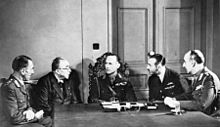
Some people mistakenly believe Metaxas tried to stay neutral between Britain and Germany. Or that he favored Germany. However, recent studies show that Greece under Metaxas remained a close friend of Britain. He never planned to join the Axis powers (Germany and Italy). Also, King George II, who had strong ties with the British government, largely guided the country's foreign policy.
Since 1923, Greece had seen Italy as its main enemy. As long as Italy and Germany were not allies, Metaxas saw Germany as a way to balance Italy's power. But when Germany and Italy formed the "Rome-Berlin Axis" in 1936, Metaxas had to rethink Greece's foreign policy. He still hoped Germany would control Italy in the Balkans. In the late 1930s, Germany became Greece's biggest trading partner, like with other Balkan countries.
To reduce Germany's influence in the Balkans, Britain started an "economic offensive" in November 1938. But there was debate in the British government about buying Greek tobacco. Metaxas was known for liking Germany because of his studies there. His government's writings praised other strong European states, especially those of Francisco Franco, Benito Mussolini, and Adolf Hitler. In October 1938, Metaxas asked the British minister in Athens for an alliance. He hoped Britain would say no, which would justify Greece staying neutral if another world war started.
However, events slowly pushed Metaxas towards France and Britain. King George and most of Greece's leaders strongly supported Britain. Greece is a country with a lot of sea trade, so it couldn't ignore the strong British Royal Navy in the Mediterranean Sea. Also, Mussolini's Italy wanted to expand its territory. This pushed Greece to lean towards Britain and France. On 4 April 1939, Italy took over Albania. Mussolini sent many soldiers to Albania, far more than needed for such a small country.
Metaxas became convinced that Italy would soon invade Greece. On 8 April 1939, Metaxas met with the British minister at midnight. He told him that Greece would fight to the end if Italy invaded. He asked for British help. Germany's support for Italy's takeover of Albania showed that Hitler backed Italy's plans in the Balkans. This left Metaxas with no choice but to turn to Britain to balance Italy's power. On 13 April 1939, British Prime Minister Neville Chamberlain and French Prime Minister Édouard Daladier announced that their countries would protect Romania and Greece.
Even though Greece declared neutrality in September 1939, Metaxas's acceptance of the British-French "guarantee" in April 1939 linked Greece with the Allies. Metaxas continued the friendly relations with Turkey that Venizelos had started. Italy's presence and plans in the Aegean Sea left him with no other choice.
Metaxas tried to keep Greece out of the war. But Mussolini demanded to occupy important Greek locations. When the Italian Ambassador presented these demands to Metaxas on the night of 28 October 1940, Metaxas simply replied in French, Alors, c'est la guerre ("So it's war"). A popular story says he just told the ambassador "Ochi!" ("No!"). This image of Metaxas saying "No!" made the previously unpopular prime minister a national hero.
A few hours later, Italy invaded Greece from Albania. This started the Greco-Italian War. The next day, Metaxas told journalists to be careful with news during the war. He said the Axis powers could not win and that Greece would be on the winning side. He explained that he had followed a policy of neutrality, but after Italy's attack, he would follow the policy of Venizelos.
The Greek Army fought well and pushed the Italians back. They even took over parts of southern Albania. In April 1941, Germany invaded Greece to help Italy.
His Legacy
Metaxas died in Athens on 29 January 1941. He died from a throat infection that led to a serious blood infection. So, he never saw the German invasion of Greece during the Battle of Greece. His successor was Alexandros Koryzis. After Metaxas's death, the invading forces had to deal with the strong defenses he had built in Northern Greece. These defenses, along the Bulgarian border, were known as the Metaxas Line.
Greeks still celebrate Ohi Day on October 28. This day remembers Metaxas's famous refusal to the Italian demand in 1940. Until a military government took power in Greece from 1967 to 1974, Metaxas was honored as a patriot and a war leader. During that military government, there were not many big projects to honor Metaxas. Some small statues of Metaxas were put up in towns. An idea to put a statue of Metaxas in central Athens was not approved by the government.
See also
 In Spanish: Ioannis Metaxás para niños
In Spanish: Ioannis Metaxás para niños
- Metaxism
 | Isaac Myers |
 | D. Hamilton Jackson |
 | A. Philip Randolph |


